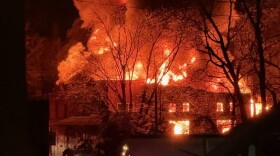For decades, Kentuckians have known they’re vulnerable to radon, but many are not protecting themselves. The radioactive gas collects in crawl spaces and basements, and has been linked to health problems. Much of central Kentucky is troubled by radon gas. Thanks to the region’s limestone and caves, radon levels here are much higher than the national average.
“Radon basically stems from decay of uranium in the ground so it’s a form of radiation,” said Clay Hardwick.
State radon coordinator Clay Hardwick says radon levels in over 40 percent of tested homes exceed limits set by the U-S Environmental Protection Agency. Medical researchers have established a link between the gas and lung cancer. Hardwick says it’s difficult to determine which lung cancers in Kentucky can be directly blamed on radon.
“At this point there is no real stream line method of collecting that type of information, I mean, the right people are not connected at this point in time,” added Hardwick.
University of Kentucky surgeon Tim Mullett often sees the affects of lung cancer. During his 15 years in Lexington, Mullett has seen far more lung cancer linked to smoking than to any other cause. In fact, Mullett sees only about two to three lung cancer patients a year who have no connection with tobacco smoke.
“Now some patients have no history of tobacco exposure. No second hand smoke, no primary smoking history. And those patients certainly should have their examined for radon levels,” said Mullett.
Nevertheless, Mullett has no doubt radon gas is sickening Kentuckians and can be blamed for some lung cancers.
Recent federal statistics show, out of every 100-thousand Americans, 50 will die of lung cancer. In Kentucky, the disease will kill 75. Some of those cases could be linked to radon, but, Mullett says there’s no way to visually inspect a lung cancer tumor and determine its cause.
“We don’t have any way to be able to detect the differences between cancers that are caused by smoking related illness versus those that are caused by radiation exposure,” said Mullett.
Given the risk, the Commonwealth of Kentucky has long promoted radon tests. When they show high levels of radon, homeowners are urged to fix the problem. Normally, mitigation systems vent the radioactive gas so it doesn’t collect in basements, crawl spaces and other places within a home.
Such installations are done by Kyle Hoylman, who figures about a million homes in Kentucky have elevated radon levels. But, he says, only about 25 hundred mitigations are done here each year. And then there is new construction. Given those numbers, Hoylman says the state should change the way such homes are built so radon’s risk is reduced.
“If we do two thousand to 25 hundred on existing homes every year and the housing industry is introducing two thousand five hundred to three thousand new residential units with a radon problem, in fact, we’re going backwards in the state of Kentucky. That number is growing. It’s not getting smaller,” said Hoylman.
Hoylman says some new houses are constructed with mitigation systems, such as ventilation and gas barriers, already in place. But, he adds it accounts for about ten percent of newly built homes.
As for residences already equipped with such systems, Hoylman says many are ineffective.
“By my estimate Stu, fully 75% or greater of all homes in the state of Kentucky that have a mitigation system contain at least one major deficiency with that system,” explained Hoylman.
Earlier this year, Kentucky’s General Assembly passed legislation that increases regulations on firms that install mitigation systems. It was approved and signed by the governor, but its full affect won’t be felt until 2013. Until then, the state says property owners should protect themselves by seeking out reputable firms that test for radon. State radon coordinator Clay Hardwick says a good place to start is on-line at radon-gas-dot-com.



